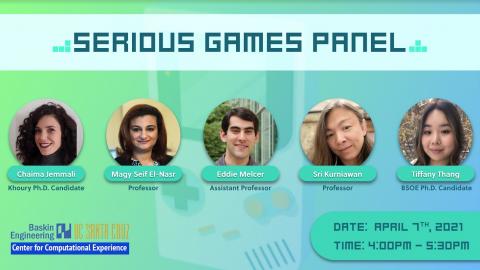
Join the Center for Computational Experience and our four panelists, Edward Melcer, Sri Kurniawan, Magy Seif El-Nasr, and Chaima Jemmali, will discuss their research projects ranging from educational games to therapy games.
Panelist Talks & Bios:
Training the Next Generation of Researchers: Exploring the Potential of Interactive Narrative for Teaching Ethics and Moral Reasoning
Dr. Edward Melcer is an independent game developer, director of the Alternative Learning Technologies and Games (ALT Games) Lab, and Assistant Professor in the UCSC Department of Computational Media. His primary research interests are at the intersection of games, human-computer interaction, and learning science, where he explores the usage of novel gameplay mechanics to enhance learning outcomes in educational games.
His recent research in the areas of interactive narrative, tangibles, and embodiment for educational games have received Best Paper Honorable Mention awards at the ACM CHI Conference on Human Factors in Computing Systems and an Exceptional Paper award at the Foundation of Digital Games Conference.
Dr. Melcer’s educational games similarly have won awards in venues such as the Serious Games Showcase & Challenge and Games for Learning Design Competition, and his independent games have been featured in a number of premiere venues such as IndieCade, IndieCade East, and Come Out & Play.
Magy Seif El-Nasr & Chaima Jemmali
Developing Methods to Uncover How People Learn Programming
Magy Seif El-Nasr is a Professor and Vice Chair of Serious Games in the Computational Media Department at University of California at Santa Cruz.
Dr. Seif El-Nasr earned her Ph.D. from Northwestern University in Computer Science. Her research focuses on two goals (a) developing automated tools and techniques for authoring, adapting, and personalizing virtual environments (e.g., interactive narrative, believable characters, and visuals), and (b) developing methodologies to model and understand players’ behaviors and motivations through the development of novel mixed-methods approaches that use machine learning and visual analytics tools.
A few year ago, she published the first book on the subject of game analytics, called Game Analytics: Maximizing the Value of Player Data. This year she is working on a new textbook on the subject to be published by Oxford University Press. Her work is internationally known and cited in several game industry books, including Programming Believable Characters for Computer Games (Game Development Series) and Real-time Cinematography for Games.
She has received several awards and recognition within the game research community. Notably, she was named HEVGA Fellow in 2017 and received several Best Paper Awards, honorable mentions, and exceptional paper designations Further, she was named as a HEVGA (Higher Education Video Game Alliance) Fellow. She also serves as an associate editor for IEEE Transactions on Games and IEEE Transactions on Affective Computing.
Chaima Jemmali is a PhD candidate at Khoury working with Professors Magy Seif El-Nasr and Seth Cooper. Her research goals center around computer science education for beginners and how to use games to make programming more accessible and engaging.
She uses data-driven techniques to design her educational game by using embedded assessment methods to understand player’s misconceptions and areas of struggle.
360-Degree Video-Based VR Games for SEC Skill Training with Adults with ASD
Professor Sri Kurniawan is the Director of ASSIST Lab, which stands for Assistive Sociotechnical Systems for Individuals with Special needs using Technology.
Her interdisciplinary research focuses on the design and evaluation of interactive systems that help people with special needs, including older persons, people from third world countries, those with low socioeconomic and educational backgrounds and people with disabilities and children.
Tiffany Thang is a Computational Media PhD student working in the ASSIST Lab with Sri Kurniawan. Her research focuses on understanding how 360-degree video-based VR games can be used to assist individuals with special needs in learning and strengthening SEC skills.
She has collaborated with organizations such as Hope Services and SmileTrain, working directly with SEC skill professionals and people with special needs in developing VR games that directly address issues they face with respect to more traditional SEC skill training methods.
Register here: Serious Games Panel Registration